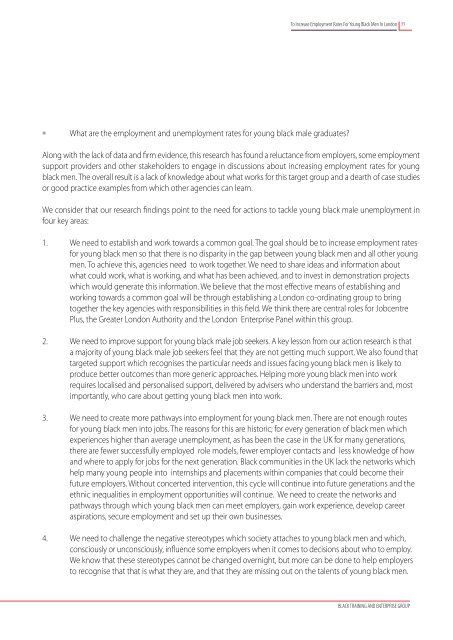1oKlU4X
1oKlU4X
1oKlU4X
You also want an ePaper? Increase the reach of your titles
YUMPU automatically turns print PDFs into web optimized ePapers that Google loves.
To Increase Employment Rates For Young Black Men In London 35<br />
l<br />
What are the employment and unemployment rates for young black male graduates?<br />
Along with the lack of data and firm evidence, this research has found a reluctance from employers, some employment<br />
support providers and other stakeholders to engage in discussions about increasing employment rates for young<br />
black men. The overall result is a lack of knowledge about what works for this target group and a dearth of case studies<br />
or good practice examples from which other agencies can learn.<br />
We consider that our research findings point to the need for actions to tackle young black male unemployment in<br />
four key areas:<br />
1. We need to establish and work towards a common goal. The goal should be to increase employment rates<br />
for young black men so that there is no disparity in the gap between young black men and all other young<br />
men. To achieve this, agencies need to work together. We need to share ideas and information about<br />
what could work, what is working, and what has been achieved, and to invest in demonstration projects<br />
which would generate this information. We believe that the most effective means of establishing and<br />
working towards a common goal will be through establishing a London co-ordinating group to bring<br />
together the key agencies with responsibilities in this field. We think there are central roles for Jobcentre<br />
Plus, the Greater London Authority and the London Enterprise Panel within this group.<br />
2. We need to improve support for young black male job seekers. A key lesson from our action research is that<br />
a majority of young black male job seekers feel that they are not getting much support. We also found that<br />
targeted support which recognises the particular needs and issues facing young black men is likely to<br />
produce better outcomes than more generic approaches. Helping more young black men into work<br />
requires localised and personalised support, delivered by advisers who understand the barriers and, most<br />
importantly, who care about getting young black men into work.<br />
3. We need to create more pathways into employment for young black men. There are not enough routes<br />
for young black men into jobs. The reasons for this are historic; for every generation of black men which<br />
experiences higher than average unemployment, as has been the case in the UK for many generations,<br />
there are fewer successfully employed role models, fewer employer contacts and less knowledge of how<br />
and where to apply for jobs for the next generation. Black communities in the UK lack the networks which<br />
help many young people into internships and placements within companies that could become their<br />
future employers. Without concerted intervention, this cycle will continue into future generations and the<br />
ethnic inequalities in employment opportunities will continue. We need to create the networks and<br />
pathways through which young black men can meet employers, gain work experience, develop career<br />
aspirations, secure employment and set up their own businesses.<br />
4. We need to challenge the negative stereotypes which society attaches to young black men and which,<br />
consciously or unconsciously, influence some employers when it comes to decisions about who to employ.<br />
We know that these stereotypes cannot be changed overnight, but more can be done to help employers<br />
to recognise that that is what they are, and that they are missing out on the talents of young black men.<br />
BLACK TRAINING AND ENTERPRISE GROUP


